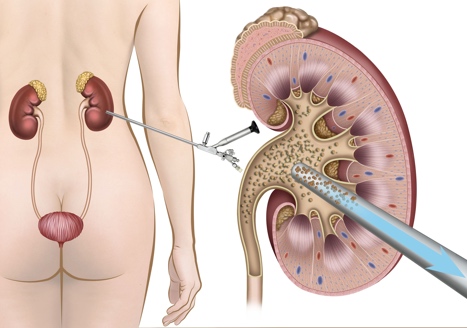Kidney stones are hard deposits that form in the kidneys. They can cause pain, nausea, vomiting, and blood in the urine. There are many different treatments for kidney stones, depending on the size and location of the stone.
Two minimally invasive procedures that are commonly used to treat kidney stones are percutaneous nephrolithotomy (PCNL) and retrograde intrarenal surgery (RIRS).
Percutaneous nephrolithotomy (PCNL) is a procedure in which a small incision is made in the back and a tube is inserted into the kidney. A nephroscope, a thin, telescope-like instrument, is then inserted through the tube to view the inside of the kidney. The stone is then broken up with a laser or ultrasonic probe and removed.

Retrograde intrarenal surgery (RIRS) is a procedure in which a scope is inserted into the ureter through the urethra and bladder. The scope is then guided up to the kidney, where the stone is broken up and removed.
Mini PCNL is a newer variation of PCNL that uses smaller instruments and a smaller incision. This can make the procedure less invasive and may result in a shorter hospital stay and faster recovery.
Which procedure is right for you?
The best procedure for you will depend on the size and location of your kidney stone, as well as your overall health. Your doctor will discuss the risks and benefits of each procedure with you and help you decide which one is right for you.
Here is a table comparing the two procedures:
| Procedure | Advantages | Disadvantages |
| PCNL | Can be used to remove large stones | More invasive than RIRS |
| RIRS | Less invasive than PCNL | May not be effective for large stones |
| Mini PCNL | Less invasive than PCNL | May not be effective for large stones |
Recovery Time
The recovery time for both PCNL and RIRS is typically 1-2 weeks. You may need to stay in the hospital for 1-2 days after the procedure. You will also need to avoid strenuous activity for several weeks.
Complications
The risks of both PCNL and RIRS are low. However, some possible complications include bleeding, infection, and damage to the kidney.
Cost
The cost of PCNL and RIRS is similar. The exact cost will vary depending on your insurance coverage. If you have a kidney stone, talk to our doctor about the best treatment option for you.
